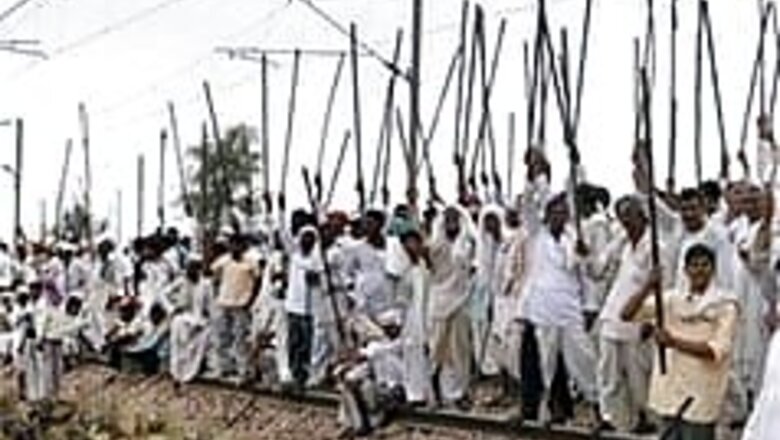
views
Jaipur: Talks between the Rajasthan government and leaders of the agitating Gurjar leaders on their demand for a Scheduled Tribe status for the community have been postponed to Friday morning.
The talks will be held in Jaipur, said sources in the state government.
Earlier, the government on Thursday released 24 Gurjar women who were arrested during the agitation, meeting a precondition the community had set for the talks.
The additional district and sessions court in Dausa district released the women on bail.
The women were arrested on June 6 for squatting on the railway track near Bandikui in Dausa district as part of the Gurjar agitation, which affected rail traffic on the important Jaipur-Delhi sector for about six days. They were charged with causing damage to rail property and indulging in violence.
"As the Dausa court has released the women on bail, we have decided to initiate talks with the Vasundhara Raje government on our charter of demands," said Prem Singh, a Gurjar leader.
The second round of talks between the Gurjars and the state government ran into rough weather after the Gurjars laid down preconditions: that the arrested women protesters be freed and murder charges withdrawn against 20 members of the community.
The preliminary talks between the Gurjars and the Rajasthan government over the community's demand for Scheduled Tribe status on Monday afternoon were described as "constructive" - in the first sign of an end to a violent agitation for affirmative action since May 23 that has claimed 39 lives.
Rajasthan Mines Minister L.N. Dave and Irrigation Minister Sanwar Lal Jat along with Irrigation Secretary and chief negotiator S N Thanvi and the Bharatpur divisional commissioner met 37 representatives of the Gurjar community on Monday at a government school in Bayana in Bharatpur district, about 160 km from here.
During the first round, the Gurjar leaders focussed on three demands: release of the Gurjars held during the agitation, restoration of power supply to some Gurjar-dominated areas, and a stop to police raids in their areas.
Earlier, the Gurjars had insisted on holding the talks in Bayana, the epicentre of the agitation where hundreds of Gurjars have been blocking rail and road traffic since May 23. However, the state government was adamant that the talks could only be held in Jaipur.
In a compromise, the two sides decided to hold "preliminary" talks in Bayana, followed by more talks in Jaipur.
The Gurjars, classified in Rajasthan among Other Backward Classes (OBC), want to be included in the list of Scheduled Tribes as they feel it would offer them better education and job opportunities.
Gurjars had also held protests all over Rajasthan from May 29 to June 4 last year to press their demand. At least 26 people were killed in the violence then.
Delhi, Bangalore join Mumbai among world's top business hubs
Indo-Asian News Service
New York, June 12 (IANS) New Delhi and Bangalore have joined Mumbai as the Indian cities ranked among the world's top 75 centres of commerce, reflecting the growing global economic clout of Asia.
Mumbai is ranked 48th, the Indian capital occupies 61st position and Bangalore is at 66th spot in the 2008 'Mastercard Worldwide Centres of Commerce Index' released this week by the world's leading credit card company based in Purchase, New York.
The Index has been extended to 75 cities from 50 last year, when Mumbai at 45th place was the only Indian city to figure in it.
London remains the global economy's most influential city, followed by New York at No 2 in the Index, which annually evaluates and ranks how major cities compare in performing critical functions that connect markets and commerce around the world.
"The future, however, appears to belong to Asia and Eastern Europe, whose cities represent the fastest rising regions within the Index," the study said.
Seven Asian economies to figure among the top 25 centres of commerce are: Tokyo (3rd), Singapore (4th), Hong Kong (6th), Seoul (9th), Osaka (19th), Taipei (22nd) and Shanghai (24th).
In terms of financial flow, Mumbai (ranked 7) and Shanghai (ranked 9) reflect the growing importance of India and China in global financial markets.
Prague at 49th and Moscow at 51st place overall indicate the rise of Eastern Europe in the global urbanised economy.
The Mastercard study rates cities on seven key criteria: legal and political framework, economic stability, ease of doing business, financial flow, business centre, knowledge creation and information flow, and liveability.
While Mumbai and New Delhi did well in terms of 'economic stability,' they fared badly in 'knowledge creation and information flows.' Bangalore scored high on economic stability.
Los Angeles at No 17 has dropped out of the Index's top 10, leaving only New York and Chicago as the North American cities in it.
The MasterCard Index is compiled from research by a panel of eight independent economic, urban development and social-science experts from leading academic and research institutions around the world. The panel is led by Dr. Michael Goldberg and includes an Indian origin person, Manu Bhaskaran, Partner/Head, Economic Research, Centennial Group, Singapore.














Comments
0 comment